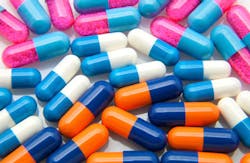Capsules are widely considered an efficient method of taking medication and health supplements, and their use is set to grow in the coming years.
According to a new report from MarketsandMarkets, the global empty capsules market was worth $1.30 billion in 2014 and is predicted to reach a value of $1.82 billion by 2019, expanding at a compound annual growth rate (CAGR) of 7.0 percent over the period.
The key driver of the market is said to be the rapid evolution of the pharmaceutical and nutraceutical industries as a result of aging populations, rising income levels, increasing awareness of personal health, easy access to high-quality healthcare facilities and favorable government initiatives.
A wide variety of therapeutic applications use capsules, including antibiotic drugs, vitamins and dietary supplements, antacid and antiflatulent preparations, anti-inflammatory drugs, cardiovascular therapy drugs, cough and cold remedies and antiemetic preparations.
Hard gelatin capsules account for the largest share of the global empty capsules market and are expected to remain in the lead over the next few years. However, there is also growing demand for alternatives to gelatin, such as hydroxypropyl methylcellulose (HPMC). That growth is driving the market, together with the demand for innovative drug delivery formulations in the pharmaceutical industry and increased consumption of dietary supplements.
Factors that will restrict market growth include rising gelatin prices, increasing demand for soft gelatin capsule formulations and the need for high capital expenditure from manufacturers to enter the empty capsules market, MarketsandMarkets reported.
North America was the largest regional market in 2013, followed by Europe, Asia-Pacific and the rest of the world. The strongest growth in 2014-2019 is likely to be seen in Asia-Pacific, primarily because of increasing health awareness and the growing affordability of healthcare services in this region.
